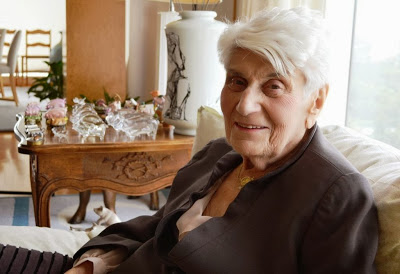Celebrating The Life Of Naomi Warren
 You can learn a lot by studying the exemplary lives of those we lose. Naomi Warren's life story is worth a review. She passed away recently at the age of 96. The below are important facts that should be learned and absorbed from her obituary in the Houston Chronicle.
You can learn a lot by studying the exemplary lives of those we lose. Naomi Warren's life story is worth a review. She passed away recently at the age of 96. The below are important facts that should be learned and absorbed from her obituary in the Houston Chronicle.
Naomi Warren was born Naomi Kaplan in Wolkowysk, Poland (today Belarus) on September 1, 1920. Her early life with her siblings Mark and Elizabeth was joyous, blessed with lively discussions, family gatherings, and trips to the countryside for holidays. She was taught early in life the importance of education, and she thrived in school and in sporting endeavors. Naomi's innocent youth was brought to an abrupt halt by the rise to power of the Nazi Party. Poland was invaded by Germany on her birthday in 1939, while she was finalizing her plans to attend university in England. Shortly after this life-altering event, further disruption came upon the Kaplan family when Soviet troops marched into Poland from the east, taking Wolkowysk under their control. Her father Samuel was taken prisoner by the Russians and sent to Siberia because, as president of the local bank, he was considered to be a capitalist.
With this negative came a positive; the law enforcing a quota of how many Jews could attend Polish universities was altered. This meant that Naomi could enroll in a university in nearby Bialystock. Indeed, this was a life changing possibility, for in Bialystock, Naomi was to meet a handsome young physician, Alexander Rosenbaum, who she married in 1940.
Again, Naomi's good fortune was cut short by world events. In the summer of 1941, German forces overtook eastern Poland and began to separate, intern, and murder Jews in the Polish population. By January 1943, as the Nazis pursued their ideology of racism and worked towards the "final solution," Naomi, Alexander, and her mother and brother were gathered and placed in rail cars to be transported to Auschwitz-Birkenau. Naomi has said of that horrendous, terrifying trip, "It seemed to last a lifetime." Upon arrival, Naomi was separated from her loved ones as the men and the women were sent to different parts of the killing center and labor camp. Naomi was selected for labor; her mother was selected for death and sent to the gas chambers. One of the most harrowing aspects of Naomi's testimony is her description of her mother being put on a truck, looking at Naomi for the last time with her beautiful gray eyes.
Alexander would perish in Auschwitz several months after arrival. Naomi resolved to survive. Remarkably, she did, despite deadly conditions, illness, and starvation. In her testimony, Naomi spoke about her conviction to remain alive. She knew it was essential to go out to work, despite how miserable, weak, and ill she might feel. Her valiant effort and her determination allowed her to survive Auschwitz-Birkenau. As 1945 began and Soviet troops neared Auschwitz, Naomi and her fellow female prisoners were transported to the infamous women's camp, Ravensbrück. This camp was terrifying; regularly, surgery was done without anesthesia, and heinous experiments were conducted on prisoners. Naomi's determination continued. She was fortunate to volunteer to move to a new location, and she next was interned at Bergen-Belsen, from where she was liberated in April of 1945 by the British.
In 1946, Naomi was again fortunate, having used her ingenuity and determination to contact family to let them know she had survived. With the help of her uncle, her sister, and brother-in-law, who had settled in the United States before the war, Naomi made her way to America. Hearing her speak about seeing the Statue of Liberty in the New York harbor was always moving. She loved her new found freedom and reveled in her opportunity to become an American citizen.
Naomi first lived in New York, where she met Martin Warren, a fellow Holocaust survivor. They would marry, after meeting while Martin had been invited to a dinner with a blind date. That didn't work out for his date because Martin and Naomi left the dinner together, and the rest is their history.
Working from their garage and the trunk of their car Martin and Naomi established a company importing sardines. From these humble, hardworking early days would grow a thriving business.
Naomi was recognized widely as a leader in Houston. Certainly, she was a leader at Holocaust Museum Houston, always supporting the Museum's mission with her resources, intellect, integrity, and compassion. Naomi exemplified empathy and action. She served on the Board of Holocaust Museum Houston, as a Lifetime Trustee of the Jewish Federation of Greater Houston.
In her honor and memory, we offer a reflection from an award-winning Warren Fellow and teacher, Erin Balfour: "We celebrate her life not only as a singularly magnificent human being, but also as one who shaped the lives of so many around her. She is the stone dropped in the pond that sent ripples throughout the world. Ripples of peace, love, and hope."



